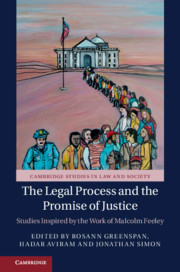Book contents
- The Legal Process and the Promise of Justice
- Cambridge Studies in Law and Society
- The Legal Process and the Promise of Justice
- Copyright page
- Contents
- About the Contributors
- Introduction: Past as Prologue
- Part I The Process Is the Punishment
- Part II Court Reform on Trial
- Part III Judicial Policymaking and the Modern State
- 10 Judicial Deference in the Modern State
- 11 The Law of the Workplace
- 12 Administrative “States” of Judicial Policy on Gender-Motivated Violence
- 13 Can Courts Abolish Mass Incarceration?
- 14 Policy-Making by Out-of-Court Settlements: Palestinian Informers at the Israeli High Court of Justice
- Part IV Political Liberalism and the Legal Complex
- Index
- Books in the Series
- References
11 - The Law of the Workplace
from Part III - Judicial Policymaking and the Modern State
Published online by Cambridge University Press: 18 April 2019
- The Legal Process and the Promise of Justice
- Cambridge Studies in Law and Society
- The Legal Process and the Promise of Justice
- Copyright page
- Contents
- About the Contributors
- Introduction: Past as Prologue
- Part I The Process Is the Punishment
- Part II Court Reform on Trial
- Part III Judicial Policymaking and the Modern State
- 10 Judicial Deference in the Modern State
- 11 The Law of the Workplace
- 12 Administrative “States” of Judicial Policy on Gender-Motivated Violence
- 13 Can Courts Abolish Mass Incarceration?
- 14 Policy-Making by Out-of-Court Settlements: Palestinian Informers at the Israeli High Court of Justice
- Part IV Political Liberalism and the Legal Complex
- Index
- Books in the Series
- References
Summary
Because of the fragmented and piecemeal development of federal labor policy in the United States, US courts have had many places of entry to participate in workplace regulation. This is, at least in part, ironic. The initial ambition of Progressive Era legislators and activists to develop a federal labor policy in the late nineteenth and early twentieth century was to counter the ongoing activism of the Lochner era judges who were striking down federal and state statutes in order to defend a more unbridled capitalist economy. Both the federal government and a majority of state governments responded by passing labor and workplace statutes designed to check courtroom intervention and substitute regulation, administration, and arbitration over litigation. During the 1930s, the efforts of legislators to overcome judicial activism restricting labor rights reached an apex.
- Type
- Chapter
- Information
- The Legal Process and the Promise of JusticeStudies Inspired by the Work of Malcolm Feeley, pp. 215 - 229Publisher: Cambridge University PressPrint publication year: 2019

